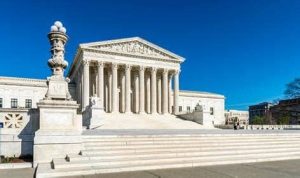The Supreme Court will look at three election law cases regarding campaign spending limits, redistricting according to race, and whether ballots received after Election Day can be counted.
Political Parties Coordinating Spending With Candidates
The Supreme Court will look at whether federal limits on how much political parties can spend in coordination with candidates violate the free speech protections of the Constitution’s First Amendment.
The case is National Republican Senatorial Committee v. Federal Election Commission.
Restrictions on spending by party committees that are coordinated with candidates for Congress and president were created on the theory that not having limits encourages corruption and allows wealthy donors to have outsized influence.
Two Republican party committees, Vice President JD Vance, and former Rep. Steve Chabot (R-Ohio) challenged the limits in the Federal Election Campaign Act.
The petition noted that Congress had built a wall of separation between party and candidate, “forcing party committees to figure out how to get their candidates elected without hearing from them.”
Challenge to Ballot-Counting After Election Day
The Supreme Court will take up a congressman’s challenge to an Illinois law that allows ballots to be counted if they are received up to 14 days after Election Day. The case is Bost v. Illinois State Board of Elections.
A victory for the challenger, Rep. Michael Bost (R-Ill.), could open the door to more lawsuits being filed in other states against the late counting of ballots.
Eighteen states, including Illinois, accept mailed ballots received after Election Day if they bear a postmark from Election Day or before that date, according to the National Conference of State Legislatures. The District of Columbia, Guam, Puerto Rico, and the Virgin Islands also follow the same rule.
Bost sued in 2022, saying the Illinois law extending counting beyond Election Day conflicts with federal law, which takes precedence over state law.
“Federal law sets the first Tuesday after the first Monday in November as the federal Election Day,” Bost said.
Redistricting to Favor Minorities
The Supreme Court will again consider whether an election map for Louisiana that includes two black-majority congressional districts discriminates against non-black voters.
“You can’t draw district lines based on race, and this affects everything from Congress on down to county council,” he said. “When you say you’re maximizing black seats that you’re going to draw on the basis of race, you violate the 15th Amendment.”

